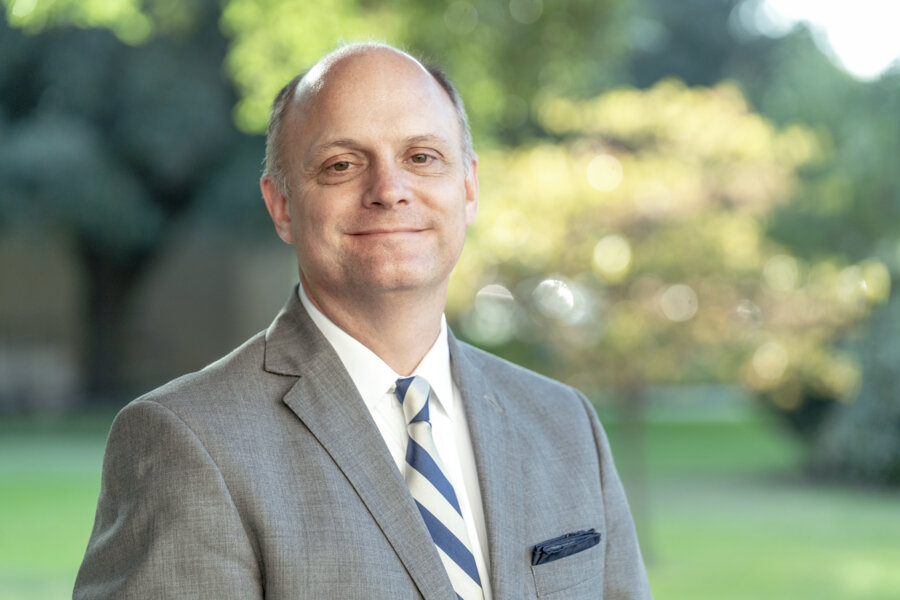Five trends guide Wilder in new role as associate provost for innovative learning at Southwestern Seminary, TBC

In his newly created role as associate provost for innovative learning, Michael S. Wilder said his daily mission is to ensure Southwestern Baptist Theological Seminary and Texas Baptist College are “delivering premier online theological” education.
Wilder, who was appointed to the new role in June following nearly three years of service as the dean of the Jack D. Terry School of Educational Ministries at Southwestern Seminary, envisions five trends that will help guide his effort, including high engagement learning, student success, ministerial and vocational readiness, an increasing movement to online education while maintaining residential learning, and growing church partnerships including internships and residencies.
“Dr. Wilder is a forward-thinking innovator as well as a faithful seminary educator who will help us greatly as we craft the future of online education,” said Benjamin M. Skaug, provost and vice president for academic administration.
In addition to providing oversight of all non-traditional academic programming, Wilder will lead collaboration efforts with fellow academic leaders in advancing educational excellence, faculty development, and strategic innovation, with specific areas of focus including online education, flex-access delivery, and ministry partnerships, said Skaug. Wilder remains in his faculty role as professor of educational ministries in the Terry School.
“I’m grateful to be a part of an institution that is looking intentionally into the future of theological/Christian higher education in determining how do we best serve the church,” Wilder said. “We have academic leaders here who desire this institution to be the very best, and I think part of that means seeing the future and making the adjustments today.”
“Innovative learning, at its core, is centered upon utilizing various teaching methodologies and technological advancements to increase learner engagement for the purpose of enabling the student to think critically, value deeply, and skillfully act so that he or she becomes a more competent Great Commission minister,” Wilder explained while noting “the future of Christian higher education will likely look very different than it does today regarding online delivery and technological adaptations.”
As advances in technology continue, Wilder said, “We have barely begun to experience the anticipated changes which will result from new technologies. I am confident we will experience greater focus upon individualized student learning, competency-based education, and technology-mediated teaching processes.”
High-engagement learning, Wilder explained, “includes the social dynamic of the classroom and learning community experience.” He said online students want a “pathway” that helps them succeed in the classroom and complete their degrees, but also provides mentoring, coaching, and spiritual formation.
“Ultimately high-engagement learning will arise from more intentional teaching methods, course design, increased student responsibility for active learning, and curricular structures,” Wilder observed. “Our faculty will help one another in this endeavor. We have such a creative and intelligent faculty at Southwestern and when we gather to discuss teaching and learning, it is amazing to hear of all the effective approaches being utilized in our classrooms.
Through online education, Wilder added, the seminary and college have a “beautiful opportunity” to provide theological and Christian higher education around the globe as “the church is expanding across the nations.”
Wilder said the future of theological education includes “thinking differently about online education” while also recognizing that “students want to be knowledgeable, competent, and ready.” He believes churches “want us to produce men and women…who are knowledgeable, competent, and ready with the assumed theological, biblical orientation foundation.”
The ultimate goal, Wilder explained, is to help students learn best and “help them become highly engaged learners” so they are “well-prepared ministers of the Gospel.”
Southwestern Seminary and TBC “are committed to delivering premier online theological education for the global church by prioritizing high-engagement learning, student formation, program success, and vocational readiness,” Wilder concluded. “As we seek to help every student live their calling, we believe that the faculty, program mentors, and ministry coaches have an indelible role to play in that educational process.”
Wilder, who served at Southern Baptist Theological Seminary as associate vice president for doctoral studies before beginning his service at Southwestern Seminary, holds a Doctor of Philosophy in Christian education and leadership studies from the Kentucky-based seminary. He also earned a Master of Divinity from New Orleans Baptist Theological Seminary and a Bachelor of Business Administration in management from Clayton State University in Morrow, Georgia. Wilder has additional teaching experience at New Orleans Seminary.



